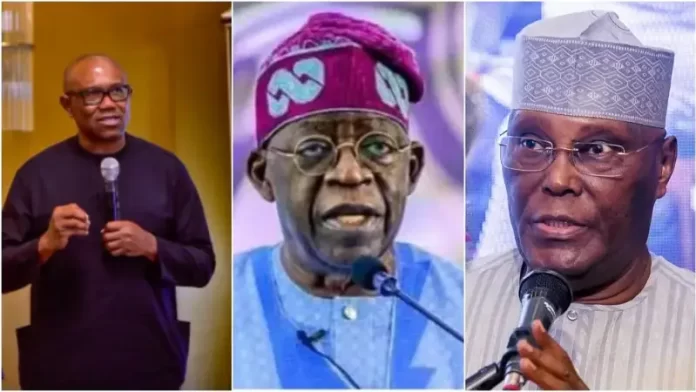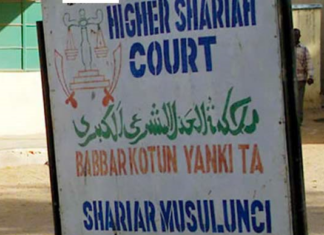The winner of the 2023 presidential election will likely be the person who wins the majority votes in three regions, and perform fairly well in at least one. Who is that candidate?
By Ishaya Ibrahim, News Editor
Nigeria has 93.4 million eligible voters for the February 25 presidential election, as against 84 million in 2019 and 68 million in 2015.
The voter turnout in 2019 was 35% as against 32% in 2015. In 2023, it may likely be higher.
The candidates
In the 2023 presidential election, three presidential candidates are the frontrunners – Atiku Abubakar of the Peoples Democratic Party (PDP), Peter Obi of the Labour Party (LP), and Bola Tinubu of the All Progressives Congress (APC).
Although the Kano political tactician and New Nigeria Peoples Party’s candidate, Rabiu Musa Kwankwaso, seems convinced that the huge votes in Kano is the ace in the game, he so far remains more of a spoiler than a presidential contender.
Atiku, a veteran on Aso Rock contest takes on opponents who haven’t run that race before. Will that be of any advantage to him?
The Labour Party’s Peter Obi enjoys the momentum, majorly from youths, and from the South East region where he has no rival, largely because the zone has neither produced president nor vice president since 1999.

Then comes the old political horse, Bola Tinubu, whose campaign point has centered on his work and those of his successors in Lagos. Will that record be enough to give him the seat in Aso Rock, or will the much talked about failures of the ruling All Progressives Congress (APC) undermine his chance?
Influencing factors
Ethnicity, religion, insecurity, inflation, and more recently, shortage of cash, will combine to shape the outcome of the 2023 presidential election.
READ ALSO:
ANALYSIS: Atiku, Tinubu, Obi, who has the better economic plan?
The following voting bloc may emerge in the poll – (i) South East – They see Obi as a chance for the region to produce Nigeria’s president for the first time since 1999. They will vote overwhelmingly for him. (ii) Northern Christians – They feel slighted by Muslim-Muslim ticket. They will shun the ticket. (iii) South West – They are motivated to have one of their own in Aso Rock, they will give Tinubu majority of their votes. (IV) Northern Muslims – Initially excited by Muslim-Muslim ticket of the APC, they have started losing faith in it after Tinubu muddled up the most recited part of the Holy Qu’ran (Suratul Fatiha). The majority of them will vote Atiku, but Tinubu will still pull a lot of votes in the region.

The South-South will not be voting in bloc in this election even though they have one of their own, Ifeanyi Okowa, as the PDP vice presidential candidate. The region is up for the grabs.
The numbers
North-West will have the highest volume of votes with 22.2 million registered voters, followed by South West with 17.9 million, and North Central, 15.3 million. South-South has 14.4 million registered voters, North East, 12.5 million, and South East, 10.9 million.
The North West controls 24 per cent of the votes. The South West holds 19 per cent. The North Central has about 16 per cent. The South-South has 15 per cent. The North East has 13 per cent, while the South East has 12 per cent. Given the comparative strengths of each of the gladiators, the winner of the 2023 presidential election will likely be the person who wins the majority votes in three regions, and perform fairly well in at least one. Who is that candidate?
How the votes will go?
South West
Tinubu has the advantage in the South West and will undoubtedly win the majority of its 17.9 million votes, but not by so much significant margin. The reason is because the voters in Lagos are hybrid, and Lagos hosts nearly 40 per cent of the South West votes.

Peter Obi will fare well in Lagos, and may even go neck and neck with Tinubu in the city, especially because the Igbo is the second largest ethnic group after the indigenous Yoruba in Lagos, and are likely to give Peter Obi the required bloc push for the Villa in Lagos.
Atiku hopes to ride on the momentum in Osun where a PDP governor emerged in the last election. He hopes to also harvest votes in Oyo, and also Ogun where the PDP appears to be waxing.
The South-South
Majority of the governors in the South-South are PDP, except for Cross River.
The South-South has faithfully voted PDP in previous elections, but may have to share the region with the Labour Party in this election, with Tinubu also scratching some votes there.
Nyesom Wike has already put some spanner in the works of Atiku in Rivers. Obi’s support is huge in Edo, and Cross River. But the PDP has the advantage in Delta and Akwa Ibom.
In Delta, Atiku’s running mate, Ifeanyi Okowa, is the governor, and in Akwa Ibom, Atiku’s Campaign Director General is the governor. The South-South will no doubt be a field for the PDP and Labour Party to harvest votes from.
But again, given the political rallies that have been organized to rouse support for Peter Obi, it is clear that the Labour Party presidential candidate commands a lot of following in the region, especially in the urban centres of Uyo, Auchi, Port Harcourt, Calabar and others. But do these supports exist in the villages too? It is not clear. But whatever it is, Peter Obi will battle this region closely with Atiku.
South East
This is indisputably a Labour Party stronghold where Peter Obi will coast home easily, even in Ebonyi and Imo where APC has governors running the states. He is expected to get not less than 75% of the votes. Atiku also has considerable following in the region, given that the area had before now, been a PDP enclave. Most political elite in the zone belong to the party. It is expected that they would pull their clout for the Wazirin Adamawa
North West
By far the largest vote by region in Nigeria, the North West holds more than 22 million votes or 23 per cent of the total votes in Nigeria. But for the first time in 20 years, President Muhammadu Buhari will not be on the ballot. The ruling All Progressives Congress (APC) may not inherit his bloc votes in this region. The APC will have to share the votes amongst PDP and NNPP. No one candidate will come out with any huge advantage from this region. Atiku and Tinubu are however expected to get the most votes in the North West, followed by Kwankwaso. But given Tinubu’s recent flip flop in reciting the most recited chapter of the Holy Quran (Suratu Fatiha), and with the voters questioning whether he is indeed a Muslim, the momentum in the North West seems to be favouring Atiku.
North Central
There is no telling where the North Central will go, but it will certainly be a battle ground for the APC, PDP and the Labour Party. The Labour Party may make incursion into this region because of Benue and Plateau states where its supporters have been pushing strongly. Atiku looks good to sweep Kogi and Niger. He may also make impact in Kwara and Nasarawa which is the home state of the APC. Overall, APC and PDP are expected to struggle for the majority place in this region, followed by Labour Party.
North East
In the North East, Borno and Yobe have traditionally voted along the APC line, and may not change in 2023. The two states have ethnic and religious ties – majority Kanuri and predominantly Muslims. The APC’s vice presidential candidate, Kashim Shettima, is from Borno, and may enjoy a bloc support from his people.
But Atiku is expected to win Adamawa, Taraba, Bauchi and Gombe. In the North East, Atiku has the advantage.
Then, what happens?
For the first time in 24 years, the Peoples Democratic Party (PDP) may lose majority of the votes in the South East, and looks threatened in the South-South too. Labour Party looks good in these regions, plus Obi has been coming top on many polls.
Tinubu is secure in the South West, may come behind Atiku in North West and North East.
Kwankwaso can only boast of Kano and no more.
Also, for the first time in the current dispensation, the presidential contest has the frontline contenders from the three major ethnic groups in Nigeria – Hausa/Fulani, Igbo, Yoruba. The Hausa/Fulani will be dividing their votes amongst Tinubu, Atiku and Kwankwaso. The Yoruba will vote Tinubu en masse. A number of them will not. While the Igbo will overwhelmingly vote Peter Obi.
The vote is too close to call
The campaigns are already indicating that the 2023 presidential election will produce a voting pattern never seen in previous elections. The South East will overwhelmingly vote Peter Obi. The South-South will see Obi and Atiku contending for the majority votes, with Tinubu trailing behind the duo. The South West will largely vote Tinubu, but Atiku and Obi will also get a bite of the pie. In the North Central, none of the candidates has an edge. Atiku and Tinubu will battle in the North West and North East, but Atiku appears to have an edge in these two regions.
Who wins?
It is not too clear. If the Muslim-Muslim ticket holds for Tinubu and the majority Muslim North vote for him, he could easily coast home to victory. Even at that, Atiku and Kwankwaso are also Muslims, which makes the race tight for the three. If the South-South and North Central hold for Obi, the LP presidential candidate will also coast home to victory. But if Atiku secures the lead votes in all three regions in the North and win South-South, then he wins.













